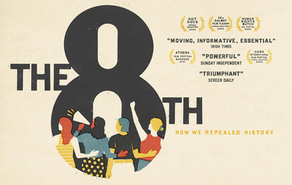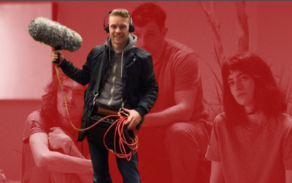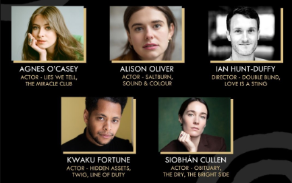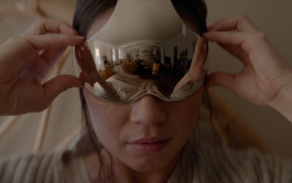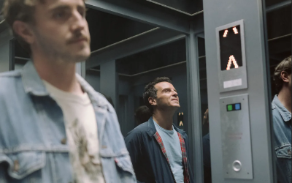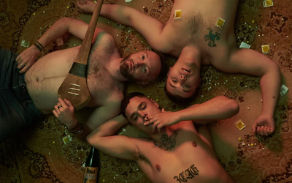We spoke with the three directors behind the documentary to find out more about the origins of their collaboration, interweaving a narrative between contemporary and historical materials, and the art of verité filmmaking.
The 8th makes its Video-On-Demand release in Ireland and the UK on Tuesday, May 25th, to coincide with the third anniversary of the referendum.
Directed by Aideen Kane, Lucy Kennedy and Maeve O’Boyle’s The 8th is the first independently made documentary about the triumphant referendum campaign led by a group of women including Ailbhe Smyth and Andrea Horan to repeal the Eighth Amendment and change Ireland’s abortion laws after a 35-year long struggle.
“We came together as three Irish women working in documentary filmmaking with a keen interest in the subject - we had all grown up in Ireland under the shadow of The 8th Amendment,” the trio explained when discussing how the three-way collaboration first came about.
“We each brought different skill sets to the table,” they explained. Aideen Kane had a wealth of experience in producing television and feature documentaries in Ireland and the US; Maeve O’Boyle’s career had mainly been as an editor and storyteller in the independent documentary space; and Lucy Kennedy’s career had been more focused in journalistic documentary storytelling.
“It was such a massive subject that we knew we needed to collaborate on it, that no one person could tell this story, but combined we thought that we just might be able to pull it off!”
Developing a shorthand
The three directors first came came together in 2016 and established a regular line of communication together with a call at least once a week. “We spent the first year digging into the subject, reading about it, and researching the history and the people involved,” they explained.
However, as is the nature of independently funded documentaries, each of the directors had to work on other projects alongside the making of The 8th. “Our biggest issue was always time and resources, but because we had so little time, we were very efficient,” they told IFTN. “We just cut to the chase, divided the jobs up, and were very collaborative.”
When approaching the distribution of tasks, the trio explained that part of the decision making was based on geography and the other part on individual skill sets. “When we started on the film, Lucy and Aideen were both living in New York, so Maeve was often the one coordinating things on the ground, and Lucy and Aideen would take chunks of time off work and fly in for extended periods for research and filming,” they explained.
In the leadup to the referendum the three directors were on the ground filming in different locations. “For example, Aideen might be in Roscommon filming with canvassers, Lucy in Killarney filming a pro-life event, and Maeve at Together for Yes HQ following Ailbhe around,” they continued. “We worked very collaboratively throughout, and with independent documentary you just do what needs to be done.”
Interweaving the narratives
Director Maeve O’Boyle led the edit on behalf of the directors, working closely with Jordan Montminy who co-edited the documentary. Having filmed over a three year period, the production team had accumulated a wealth of footage that they actively filtered through ahead of the editing process.
“We began screening the material many months before the edit started and honed down the key material around Ailbhe and Andrea into two strands; we also did this with Wendy Grace,” O’Boyle explained. “Once we viewed these key scenes we were clear what we had in terms of verité storytelling.”
The decision was then made to split the film into a 3 Act structure. “The first Act had the goal of introducing the main protagonists, addressing the issue, and setting the stakes through the historical story of 1983,” O’Boyle continued. “The second Act was mainly the campaign itself, which was driven by the best material we captured on the ground and inside Together for Yes HQ, and the last Act was the outcome of the referendum.”
The directors had also already established that the documentary would also have a historical strand interwoven throughout to contextualize the contemporary story. “We wanted that to act almost like a dark cloud interweaving throughout the film to remind you what had happened in the past in Ireland,” O’Boyle explained.
“We worked early on with our graphic designer Conor O’Boyle on finding ways to flashback into the past throughout the film and he helped us build a historical timeline that we felt would have its own arc running through the film culminating in Tuam in 2017.”
The historical strand of the film examines key incidences that impacted women’s lives during the enactment of the eight amendment - most notably ‘the X Case’ in 1992, which saw a 14-year-old rape victim refused permission to leave the country for an abortion, and the Halappanavar case in 2012, which investigated the death of Savita Halappanavar who died of septicaemia after she was denied her request for an abortion.
“These were moments of great pain and tragedy that outraged Irish people, yet they were also two seminal events that galvanized people and propelled the movement for reproductive rights forward,” the directors said. “We thought long and hard how to tell these stories, and ultimately tried to let them speak for themselves as much as possible.”
“For these historical moments, we decided to let them be told primarily through contemporary stylized footage of the key locations - i.e. Galway Hospital and The Four Courts and contemporaneous archive,” they explained. “By relying on the archive of the time, rather than a retrospective retelling, we felt we could tap into the emotion and anger that they aroused within Irish society at the time.”
“Silence, Stigma, Shame”
When asked about their tonal approach to the film and where the production team took inspiration from during the process, the directors explained that during the edit they had 3 cards on the wall saying “Silence, Stigma, Shame.” These words became reference points for the team and set the tone throughout the making of the film.
“We wanted to keep in mind that the core idea behind this film was to access that silence and stigma around women’s lives and bodies that has existed for so long in Ireland,” the directors explained. “We also wanted to turn that idea, towards the later part of the film, by centring and elevating the women directly affected by The 8th amendment.”
“This was what we called the ‘chorus of voices’ - we wanted to evoke a sense of release and of letting go - women were no longer being silenced - their stories are now being told for everyone to hear,” they said.
Something the directors explained was very intentionally placed right before the vote.
“Although this is a poignant moment in the film it is also tonally a release from the silence that is set up early on in the film. We built the film in a way to reach that point,” O’Boyle explained.
The directors were able to tap into their varied documentary backgrounds to aid the film, as well as take influence from a range of other filmmaker's projects that dealth with similar themes. “The journalistic style and format of Frontline was helpful in terms of dealing with the issue,” the directors told IFTN.
The directors took influence from other projects such as the AOC (Alexandria Ocasio-Cortez) documentary, Knock Down the House, for insight on how they dealt with a campaign, and the documentary about Ruth Bader Ginsburg, titled RBG. “(RBG) was interesting as it dealt with a strong, fierce woman, and our central protagonist had similar attributes,” the directors explained.
“Lucy (Kennedy) had worked on a series on Netflix called Rotten and the graphic sequences were useful for us in the edit as they interwove them,” they added.
Establishing a Focus
While featuring voices from both sides of the debate, The 8th primarily focuses on the dynamic female leaders of the pro-choice campaign, Ailbhe Smyth and Andrea Horan.
Though so many Irish women and men played a significant roles in the Repeal movement, the directors were acutely aware that for the film to work, they needed to focus on a couple of key people to tell the story.
“Ailbhe has been on the vanguard of Irish feminism and activism in Ireland for a long time. Maeve talked to her after a panel discussion, and then we all met up together and built a relationship with her,” they explained. “We talked through our ideas and plans with her and we must have said something right! She thought we were a team that could make this film and understood that it was important to document this time in Irish history.”
“Andrea is passionate about women's issues but wanted to engage in a way that felt authentic to her. We were drawn to her the minute we met her,” they explained. “She mobilized and involved the nail technicians and the young people she encountered and is very committed to people getting involved in a way that makes sense to them. Again, we met with her several times, and slowly reeled her in!”
“Andrea was determined to get this army of women who wanted to get the young women she encountered in her nail bar mobilized and involved, because after all these are the women it most impacts,” they continued.
With a project such as The 8th, the environment and narrative is ever-changing. The production had to continue to plan amid a constantly fluid situation and no guarantee of a euphoric ending. “That was stressful!” the directors admitted.
“Everyone who spoke to us for the film, and especially our main characters Ailbhe and Andrea, were all focused on the referendum. That was their priority and as documentary filmmakers you have to thread this line between being persistent and annoying your contributors,” they explained. “Ailbhe and Andrea were very patient with us and gave us fantastic access. Things changed at the drop of a hat, so particularly in the lead up to the referendum, it felt like we were always scrambling to catch up.”
Though there was no guarantee of a referendum when the team began work in 2016, they knew it was a growing movement. “No matter what happened we knew the film would be important, either documenting a massively historic moment in Irish society, or an ongoing fight,” they told IFTN. “As we came closer to the referendum date it did seem that The 8th would be repealed, but either way we knew that we were documenting one of the most important moments in Irish history.”
Funding and Support
The documentary was developed with support from funding body Screen Ireland who came on board early in the projects infancy. The three directors meet with Lesley McKimm when applying for development funding; “she was tremendously supportive and encouraging about the film,” the directors recounted.
“She recognized the importance of having a film made about the campaign to repeal The 8th, and she thought that the three of us coming together was a promising and interesting combination,” they continued.
Securing development funding doesn’t necessarily guarantee production funding with the directors outline key aspects needed to draw down the production loan. “We had to have all of our other funding in place before we could get a concrete offer from Screen Ireland,” they told IFTN. “One of our earliest supporters and funders was Abigail Disney’s production company Fork Films, we also secured funding from Open Society Foundations, Ford Foundation, Archer Gray, and the Sabrina Merage foundation in the US.”
“We were also lucky to have had an incredible crew on this film from the outset,” the directors added. “Matt Leigh and Laura McGann came on early in the development phase when we were initially shooting for a short sample. They were both very skilled as verité shooters and were able to skilfully film a scene without interrupting the flow whilst capturing the key elements of the scenes.”
Once the full campaign was filmed, the team also brought on Michael O’Donovan and Aidan McGuire for interviews and beauty shots, and Esme Pum McNamee for the historical shoot. “Michael also gave us his drone footage which we were hugely grateful for,” O’Boyle told IFTN. “Each of the camera people we hired wanted to engage with us as to the best way to capture this campaign and the footage around it.”
“Jordan Montminy and I worked on the edit - we initially began by working on different strands. Jordan worked on Andrea’s story and I worked on Ailbhe’s story,” O’Boyle explained.
“Then when we were working in Acts - we would put together Act 1 for example and screen it for Jordan and he would give us notes and likewise when he put together sections of the film we would give him notes,” O’Boyle continued. “So we worked very collaboratively, passing scenes back and forth and sharpening them as we went. Jordan cut the chorus of voices at the end and that was one scene we never changed!”
Once the team was in the edit, they also engaged with Conor O’Boyle on the graphic design elements to cover the historical sections. “Conor experimented with many styles and worked with us in terms of helping to graphically transition to the past within the film,” O’Boyle explained. “He also worked hard in creating a graphic for the opening title, which speaks to the grassroots activism that runs throughout the film.”
The production also simultaneously brought in Sarah Lynch to score the film. “Sarah was incredibly collaborative in terms of approach and always willing to experiment and sharpen her ideas as they unfolded,” O’Boyle recounted. “She is also launching the soundtrack to the film on May 25th which we’re very excited about.”
The 8th releases on Video-On-Demand in Ireland and the UK on Tuesday, May 25th.



